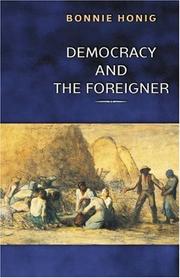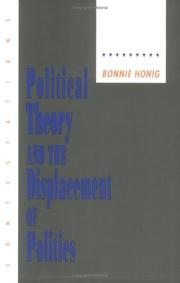| Listing 1 - 10 of 31 | << page >> |
Sort by
|

ISBN: 0271014474 9780271014470 Year: 1995 Volume: *2 Publisher: University Park Pennsylvania State University Press
Abstract | Keywords | Export | Availability | Bookmark
 Loading...
Loading...Choose an application
- Reference Manager
- EndNote
- RefWorks (Direct export to RefWorks)
Onder het motto "re-reading the canon" geven de essays in dit boek een boeiend beeld van de diversiteit binnen het huidige feminisme én ontwerpen ze nieuwe, intrigerende interpretaties van Hannah Arendts politiek filosofie.
Feminism--Philosophy --- Feminist sociology --- Feminist theory --- Feministische theorie --- Theory of feminism --- Théorie féministe --- Feminist theory. --- 1 ARENDT, HANNAH --- Filosofie. Psychologie--ARENDT, HANNAH --- 1 ARENDT, HANNAH Filosofie. Psychologie--ARENDT, HANNAH --- Sociology of the family. Sociology of sexuality --- Philosophy --- Arendt, Hannah --- Feminism --- Feminist philosophy --- Arendt, Hannah, --- Political and social views --- Blücher, Hannah Arendt, --- Bluecher, Hannah Arendt, --- Ārento, Hanna, --- Arendt, H. --- Arendt, Khanna, --- ארנדט, חנה --- アーレント, ハンナ, --- Theory --- Book
Book
ISBN: 9781107668157 9781107036970 9781139583084 9781107342279 1107342279 1139583085 9781107346024 1107346029 1107036976 1107668158 9781107348523 1107348528 1107358140 1107238544 1107255856 9781107358140 9781107238541 9781107255852 Year: 2013 Publisher: Cambridge : Cambridge University Press,
Abstract | Keywords | Export | Availability | Bookmark
 Loading...
Loading...Choose an application
- Reference Manager
- EndNote
- RefWorks (Direct export to RefWorks)
Sophocles' Antigone is a touchstone in democratic, feminist and legal theory, and possibly the most commented upon play in the history of philosophy and political theory. Bonnie Honig's rereading of it therefore involves intervening in a host of literatures and unsettling many of their governing assumptions. Exploring the power of Antigone in a variety of political, cultural, and theoretical settings, Honig identifies the 'Antigone-effect' - which moves those who enlist Antigone for their politics from activism into lamentation. She argues that Antigone's own lamentations can be seen not just as signs of dissidence but rather as markers of a rival world view with its own sovereignty and vitality. Honig argues that the play does not offer simply a model for resistance politics or 'equal dignity in death', but a more positive politics of counter-sovereignty and solidarity which emphasizes equality in life.
Political science. --- Political science --- Philosophy. --- History & Theory. --- Political philosophy --- Administration --- Civil government --- Commonwealth, The --- Government --- Political theory --- Political thought --- Politics --- Science, Political --- Social sciences --- State, The --- Social Sciences --- Political Science

ISBN: 0691088845 0691114765 9786612158032 1282158031 1400824818 Year: 2009 Publisher: Princeton, NJ : Princeton University Press,
Abstract | Keywords | Export | Availability | Bookmark
 Loading...
Loading...Choose an application
- Reference Manager
- EndNote
- RefWorks (Direct export to RefWorks)
What should we do about foreigners? Should we try to make them more like us or keep them at bay to protect our democracy, our culture, our well-being? This dilemma underlies age-old debates about immigration, citizenship, and national identity that are strikingly relevant today. In Democracy and the Foreigner, Bonnie Honig reverses the question: What problems might foreigners solve for us? Hers is not a conventional approach. Instead of lauding the achievements of individual foreigners, she probes a much larger issue--the symbolic politics of foreignness. In doing so she shows not only how our debates over foreignness help shore up our national or democratic identities, but how anxieties endemic to liberal democracy themselves animate ambivalence toward foreignness. Central to Honig's arguments are stories featuring ''foreign-founders,'' in which the origins or revitalization of a people depend upon a foreigner's energy, virtue, insight, or law. From such popular movies as The Wizard of Oz, Shane, and Strictly Ballroom to the biblical stories of Moses and Ruth to the myth of an immigrant America, from Rousseau to Freud, foreignness is represented not just as a threat but as a supplement for communities periodically requiring renewal. Why? Why do people tell stories in which their societies are dependent on strangers? One of Honig's most surprising conclusions is that an appreciation of the role of foreigners in (re)founding peoples works neither solely as a cosmopolitan nor a nationalist resource. For example, in America, nationalists see one archetypal foreign-founder--the naturalized immigrant--as reconfirming the allure of deeply held American values, whereas to cosmopolitans this immigrant represents the deeply transnational character of American democracy. Scholars and students of political theory, and all those concerned with the dilemmas democracy faces in accommodating difference, will find this book rich with valuable and stimulating insights.
Democracy --- Immigrants --- Internationalism --- Nationalism --- Consciousness, National --- Identity, National --- National consciousness --- National identity --- International relations --- Patriotism --- Political science --- Autonomy and independence movements --- Political messianism --- Intellectual cooperation --- International cooperation --- Cosmopolitanism --- International education --- Emigrants --- Foreign-born population --- Foreign population --- Foreigners --- Migrants --- Persons --- Aliens --- Self-government --- Equality --- Representative government and representation --- Republics --- Democracy. --- Immigrants. --- Internationalism. --- Nationalism. --- Sociology of minorities --- Political systems
Book
ISBN: 1282303775 9786612303777 1400830966 9781400830961 069114298X 9780691142982 9780691142982 9781282303775 9780691152592 0691152594 Year: 2009 Publisher: Princeton Princeton University Press
Abstract | Keywords | Export | Availability | Bookmark
 Loading...
Loading...Choose an application
- Reference Manager
- EndNote
- RefWorks (Direct export to RefWorks)
This book intervenes in contemporary debates about the threat posed to democratic life by political emergencies. Must emergency necessarily enhance and centralize top-down forms of sovereignty? Those who oppose executive branch enhancement often turn instead to law, insisting on the sovereignty of the rule of law or demanding that law rather than force be used to resolve conflicts with enemies. But are these the only options? Or are there more democratic ways to respond to invocations of emergency politics? Looking at how emergencies in the past and present have shaped the development of democracy, Bonnie Honig argues that democracies must resist emergency's pull to focus on life's necessities (food, security, and bare essentials) because these tend to privatize and isolate citizens rather than bring us together on behalf of hopeful futures. Emphasizing the connections between mere life and more life, emergence and emergency, Honig argues that emergencies call us to attend anew to a neglected paradox of democratic politics: that we need good citizens with aspirational ideals to make good politics while we need good politics to infuse citizens with idealism. Honig takes a broad approach to emergency, considering immigration politics, new rights claims, contemporary food politics and the infrastructure of consumption, and the limits of law during the Red Scare of the early twentieth century. Taking its bearings from Moses Mendelssohn, Franz Rosenzweig, and other Jewish thinkers, this is a major contribution to modern thought about the challenges and risks of democratic orientation and action in response to emergency.
Sovereignty. --- Democracy --- Executive power --- Sovereignty --- State sovereignty (International relations) --- International law --- Political science --- Common heritage of mankind (International law) --- International relations --- Self-determination, National --- Emergency powers --- Power, Executive --- Presidents --- Implied powers (Constitutional law) --- Separation of powers --- Law and legislation --- Powers --- Political systems --- Law of armed conflicts. Humanitarian law --- Theory of the state

ISBN: 1501712969 1501712977 9781501712975 0801427959 0801480728 Year: 1993 Publisher: Ithaca (N.Y.): Cornell university press
Abstract | Keywords | Export | Availability | Bookmark
 Loading...
Loading...Choose an application
- Reference Manager
- EndNote
- RefWorks (Direct export to RefWorks)
03 In this book, Bonnie Honig rethinks that established relation between politics and political theory. From liberal to communitarian to republican, political theorists of opposing positions often treat political theory less as an exploration of politics than as a series of devices of its displacement. Honig characterizes Kant, Rawls, and Sandel as virtue theorists of politics, arguing that they rely on principles of right, rationality, community, and law to protect their political theories from the conflict and uncertainty of political reality. Drawing on Nietzsche and Arendt, as well as Machiavelli and Derrida, Honig explores an alternative politics of virtù, which treats the disruptions of political order as valued sites of democratic freedom and individuality.
Democracy. --- Liberalism. --- Political science --- Political science. --- Self-government --- Equality --- Representative government and representation --- Republics --- Liberal egalitarianism --- Liberty --- Social sciences --- Political philosophy --- Administration --- Civil government --- Commonwealth, The --- Government --- Political theory --- Political thought --- Politics --- Science, Political --- State, The --- Philosophy. --- Democracy --- Liberalism --- 811 Filosofie --- Philosophy
Book
ISBN: 9780674248496 067424849X Year: 2021 Publisher: Cambridge (Mass.): Harvard university press,
Abstract | Keywords | Export | Availability | Bookmark
 Loading...
Loading...Choose an application
- Reference Manager
- EndNote
- RefWorks (Direct export to RefWorks)
"Bonnie Honig invigorates debate over the politics of refusal by insisting that withdrawal from unjust political systems be matched with collective action to change them. Historical and fictional characters from Muhammad Ali to the Bacchants of ancient Greek tragedy teach us how to turn rejection into transformative efforts toward self-governance"--
Feminist theory --- Autonomy --- Justice, Administration of --- Political participation
Book
ISBN: 9780801480720 Year: 1993 Publisher: Ithaca, N.Y. Cornell University Press
Abstract | Keywords | Export | Availability | Bookmark
 Loading...
Loading...Choose an application
- Reference Manager
- EndNote
- RefWorks (Direct export to RefWorks)
Book
ISBN: 1501768441 150176845X Year: 2023 Publisher: Ithaca, New York : Cornell University Press,
Abstract | Keywords | Export | Availability | Bookmark
 Loading...
Loading...Choose an application
- Reference Manager
- EndNote
- RefWorks (Direct export to RefWorks)
"This book, now in a 30th anniversary edition, has been called a founding text of agonism, which treats political contestation not as a regrettably necessary way to correct political imperfections but as a necessary, sometimes joyful feature of democratic life. By rethinking the established relation between politics and political theory, Honig argues that political theorists of opposing positions often treat political theory less as an exploration of politics than as a series of devices for its displacement"--
Book
ISBN: 0674259238 0674259246 Year: 2021 Publisher: Cambridge, Massachusetts : Harvard University Press,
Abstract | Keywords | Export | Availability | Bookmark
 Loading...
Loading...Choose an application
- Reference Manager
- EndNote
- RefWorks (Direct export to RefWorks)
An acclaimed political theorist offers a fresh, interdisciplinary analysis of the politics of refusal, highlighting the promise of a feminist politics that does not simply withdraw from the status quo but also transforms it. The Bacchae, Euripides’s fifth-century tragedy, famously depicts the wine god Dionysus and the women who follow him as indolent, drunken, mad. But Bonnie Honig sees the women differently. They reject work, not out of laziness, but because they have had enough of women’s routine obedience. Later they escape prison, leave the city of Thebes, explore alternative lifestyles, kill the king, and then return to claim the city. Their “arc of refusal,” Honig argues, can inspire a new feminist politics of refusal. Refusal, the withdrawal from unjust political and economic systems, is a key theme in political philosophy. Its best-known literary avatar is Herman Melville’s Bartleby, whose response to every request is, “I prefer not to.” A feminist politics of refusal, by contrast, cannot simply decline to participate in the machinations of power. Honig argues that a feminist refusal aims at transformation and, ultimately, self-governance. Withdrawal is a first step, not the end game. Rethinking the concepts of refusal in the work of Giorgio Agamben, Adriana Cavarero, and Saidiya Hartman, Honig places collective efforts toward self-governance at refusal’s core and, in doing so, invigorates discourse on civil and uncivil disobedience. She seeks new protagonists in film, art, and in historical and fictional figures including Sophocles’s Antigone, Ovid’s Procne, Charlie Chaplin’s Tramp, Leonardo da Vinci’s Madonna, and Muhammad Ali. Rather than decline the corruptions of politics, these agents of refusal join the women of Thebes first in saying no and then in risking to undertake transformative action.
Autonomy. --- Feminist theory. --- Political participation. --- Justice, Administration of --- Political aspects. --- Agamben. --- Antigone. --- Arendt. --- Bacchae. --- Bartleby. --- Butler. --- Cavarero. --- Euripides. --- Fabulation. --- Gender. --- Inclination. --- Inoperativity. --- Modern Times. --- Muhammad Ali. --- Refusal. --- Saidiya Hartman. --- Sara Ahmed. --- Sexuality. --- The Fits. --- civil disobedience. --- conscientious objection. --- regicide.
Book
ISBN: 0823276449 0823277062 0823276430 Year: 2017 Publisher: New York, NY : Fordham University Press,
Abstract | Keywords | Export | Availability | Bookmark
 Loading...
Loading...Choose an application
- Reference Manager
- EndNote
- RefWorks (Direct export to RefWorks)
In the contemporary world of neoliberalism, efficiency is treated as the vehicle of political and economic health. State bureaucracy, but not corporate bureaucracy, is seen as inefficient, and privatization is seen as a magic cure for social ills. In Public Things: Democracy in Disrepair, Bonnie Honig asks whether democracy is possible in the absence of public services, spaces, and utilities. In other words, if neoliberalism leaves to democracy merely electoral majoritarianism and procedures of deliberation while divesting democratic states of their ownership of public things, what will the impact be? Following Tocqueville, who extolled the virtues of “pursuing in common the objects of common desires,” Honig focuses not on the demos but on the objects of democratic life. Democracy, as she points out, postulates public things—infrastructure, monuments, libraries—that citizens use, care for, repair, and are gathered up by. To be “gathered up” refers to the work of D. W. Winnicott, the object relations psychoanalyst who popularized the idea of “transitional objects”—the toys, teddy bears, or favorite blankets by way of which infants come to understand themselves as unified selves with an inside and an outside in relation to others. The wager of Public Things is that the work transitional objects do for infants is analogously performed for democratic citizens by public things, which press us into object relations with others and with ourselves. Public Things attends also to the historically racial character of public things: public lands taken from indigenous peoples, access to public goods restricted to white majorities. Drawing on Hannah Arendt, who saw how things fabricated by humans lend stability to the human world, Honig shows how Arendt and Winnicott—both theorists of livenesss—underline the material and psychological conditions necessary for object permanence and the reparative work needed for a more egalitarian democracy.
Political science --- Democracy --- Philosophy. --- Winnicott, D. W. --- Arendt, Hannah, --- Arendt. --- Jonathan Lear. --- Sovereignty. --- Tocqueville. --- Winnicott. --- affect. --- civil obedience. --- democratic theory. --- indigenous politics. --- infrastructure. --- neoliberalism. --- object relations. --- opting out. --- race. --- von Trier.
| Listing 1 - 10 of 31 | << page >> |
Sort by
|

 Search
Search Feedback
Feedback About
About Help
Help News
News